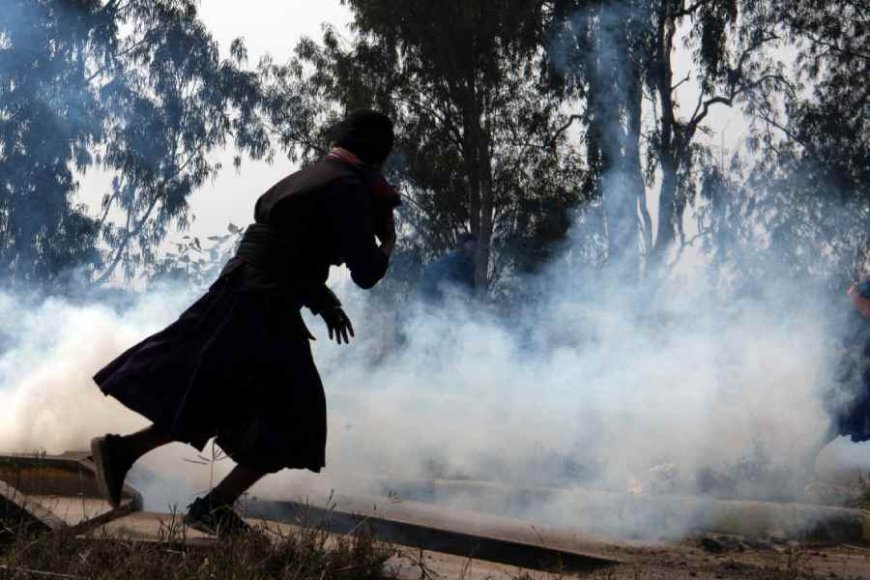Haryana Police Use Drones to Drop Teargas on Farmers, Escalating Protests at Delhi Borders
Tactic Draws Criticism, Farmers Injured; Delhi Fortifies Borders

In an attempt to stop protesting farmers from moving towards Delhi, police in the BJP-ruled state of Haryana on Tuesday employed "air power" against them by using drones to dump tear gas shells at the multi-level barricade at the Shambhu border near Ambala.
The strategy—which Israel often used against Palestinians—along with other coercive tactics led to skirmishes in which more than sixty farmers were hurt, compelling them to request an evening "ceasefire."
Union Agriculture Minister Arjun Munda told PTI that the government was still pushing for negotiations and that a legislation securing the minimum support price (MSP) for all crops could not be quickly introduced without first discussing all relevant parties. The farmers demonstrating, however, drew attention to the fact that, despite their year-long agitation, the government had promised to establish an MSP committee in 2022, but nothing had come of it.
The leaders of the agricultural unions decided to stop the protestors' march to Delhi in the evening after roughly sixty people were hurt by rubber bullets and tear gas shells. Amidst reports of farmers stone-pelting in retaliation for the tear gas bombardment, several police officers were reportedly hurt in the skirmish at the Shambhu border.
While the farmers tried to lessen the effect of the shells by covering them with jute bags and damp cloth, other videos that were shared on social media showed copious amounts of tear gas being used to scatter the demonstrators.
The use of drones to remotely hurl tear gas shells to prevent the farmers from entering Delhi was denounced by a former officer of the Intelligence Bureau. "I've never seen cops use drones to drop tear gas canisters on peaceful protestors until now. Bringing up the fact that Israel often deploys drones to drop tear gas grenades on Palestinians to put an end to unrest, he questioned, "Are we no longer a democracy?" "Seems like we're embracing the Israeli model of government these days."
The airborne devices, which are drone-based teargas launchers, were purchased by the Haryana police last year to put an end to rioting, according to a security officer working for the Union home ministry. He stated, "These drones can deliver teargas shells with precision. They carry several rounds of teargas shells, fly over mobs, and fire the shells based on the operator's commands." The security officer said, "These drone-based teargas launchers can also be used to spray ink on rioters, which later helps the police to identify them easily." A few farmers said that they were doused with ink as well.
The Haryana police and Punjab farmers got into a heated altercation at the Khanauri border, close to Jind in Haryana, when some of the demonstrators' younger members knocked down barriers at the Ghaggar River Bridge. This prompted the police to deploy water cannons and tear gas. The demonstrators said that one of the farmers was hurt when tear gas rounds were fired. At the Khanauri border, the police also used a lathi-charge on Punjabi farmers, injuring a number of peasants in the process. There were also several farmers imprisoned.
Three neighboring states, Haryana, Punjab, and Uttar Pradesh, have blocked the roads leading to Delhi with a barrier made of steel, cement, and metal spikes.
On the Gurgaon-Delhi boundary on NH48, a big contingent of police officers outfitted in anti-rioting gear, cranes, barriers, drones, barbed wire, and sand-laden dumpers were reportedly on standby to thwart any potential farmer attempts to go into Delhi, according to a Haryana police official. At Ambala, Jind, Fatehabad, Kurukshetra, and Sirsa, the state's borders with Punjab have been reinforced with barbed wire, iron nails, and concrete blocks.
In addition to securing the borders with neighboring states with barbed wire, road-spike barriers, and concrete blocks, the Delhi police have also stationed hundreds of officers along these areas.
On Tuesday, there were reports of traffic congestion and interruptions around the city as police closed off roads and rerouted vehicles. Large-scale gatherings have also been forbidden by the police in the city, particularly at the borders of Uttar Pradesh and Haryana, which are the states via which the farmers are anticipated to travel to reach Delhi.
For security considerations, the Red Fort complex in central Delhi has been temporarily closed to tourists. A large number of police and paramilitary troops are stationed there. According to the police, the closure is anticipated to last until security organizations determine it is safe to reopen.
Earlier in the day, the federal government's plan to establish a makeshift "jail" for farmers in the Bawana stadium was rejected by the Delhi government. Home Minister Kailash Gahlot of Delhi expressed his belief that the demands of the farmers are legitimate, stating that because everyone has the right to peaceful protest, "it is incorrect to arrest the farmers."
Except for the headline, this story has not been edited by Press Time staff and has been published from a syndicated feed.























































